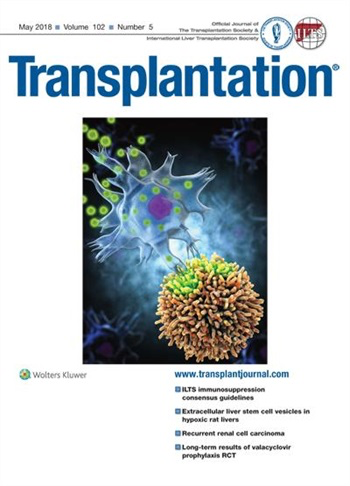
New! Transplantation - Vol. 102, No. 5, May 2018
Livers, kidneys and frail patients for lung transplantation provide some themes for your reading this month. A series of papers consider risk factors in liver transplantation. The ILTS consensus guideline for immunosuppression after liver transplantation provide important reading, and there is also news in xenotransplantation, kidney transplantation and management of PTLD and renal cell cancer.
CLICK TO VIEW THE CURRENT ISSUE
CLICK HERE TO LOGIN INTO YOUR TTS ACCOUNT FOR FULL ACCESS TO THIS ISSUE
TTS EDUCATION COMMITTEE WEBINAR SERIES
"TRENDS AND CHALLENGES IN LIVER TRANSPLANTATION"
TUESDAY, MAY 15, 2018 - 2:00 PM EDT (MONTREAL TIME)
KIDNEY PROBLEMS IN LIVER TRANSPLANTATION
 |
Moderator: Marcelo Cantarovich, MD Professor, Department of Medicine, Division of Nephrology, Faculty of Medicine, McGill University Montréal, QC, Canada |
 |
Discussant: Annmarie Huysman Liapakis, MD
|
 |
Discussant: Clifford D. Miles, MD, MS, FAST
|
STATEMENT ON THE GLOBAL KIDNEY EXCHANGE CONCEPT
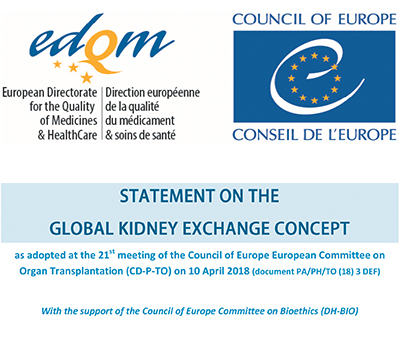
The Council of Europe’s Committee on Organ Transplantation has rejected a US-backed organ-swapping plan as “human organ trafficking” over concerns that donors will be abused. According to the committee, organ-swapping, as proposed by the Global Kidney Exchange (GKE), goes against the fundamental rule of organ donation – that “the human body and its parts shall not give rise to financial gain or comparable advantage.”
Rafael Matesanz, founder of the National Transplant Organisation (ONT) of Spain and TTS 2018 Plenary speaker commented that "GKE can be considered a disguised form of commercialization, which can be included into the trend of the rich countries to seek the easiest formula to satisfy their demands for transplant organs at the expense of the citizens of poor countries."
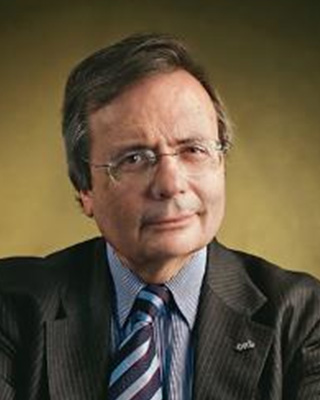
Don't miss Rafael Matesanz's plenary talk @ TTS 2018 on Challenges to improving deceased organ donation - past, present and future!
Read more at www.tts2018.org
CALL FOR HOSTING FOR THE 16TH MEETING OF THE INTERNATIONAL SOCIETY FOR ORGAN DONATION AND PROCUREMENT (2021)

The International Society for Organ Donation and Procurement aims to foster, promote and develop all aspects of organ and tissue donation and procurement. The ultimate aim is to increase the supply of high quality organs and tissue to match patients' need and to promote countries increasing performance towards self-sufficiency and improved opportunity for transplantation.
Every two years, the ISODP Congress brings together clinicians and scientists from all parts of the world in the fields of organ procurement and donation.
The most recent Congress was hosted in Geneva, Switzerland from September 5-9, 2017. The Congress welcomed 429 participants from 28 countries.
Deadline for submissions: June 15, 2018
Study Explains How Newborn Mice Can Regrow Damaged Hearts
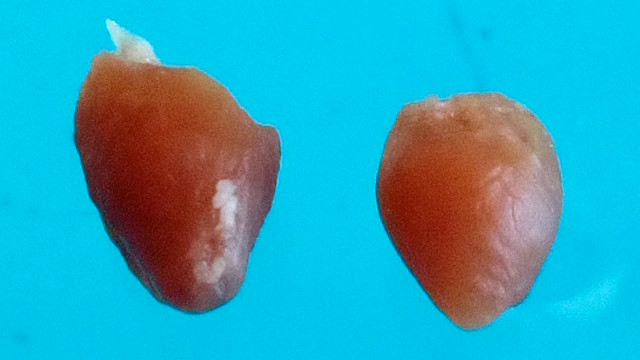
After apical tip resection, the heart from a two-day-old mouse (left) forms scars (white patches), while the heart from a one-day-old mouse (right) regenerates. | MARIO NOTARI, CMRB.
Newborn mice are able to repair damaged heart tissue better than animals injured just a few days later in their lives. What accounts for this regenerative capacity, and exactly when and why it disappears, have been unanswered questions. A report in Science Advances (May 2) posits that the extracellular matrix gets in the way of heart tissue renewal.
CLICK HERE TO READ THE FULL ARTICLE
NIH clinical trial to track outcomes of kidney transplantation from HIV-positive donors to HIV-positive recipients
The first large-scale clinical trial to study kidney transplantations between people with HIV has begun at clinical centers across the United States. The HOPE in Action Multicenter Kidney Study will determine the safety of this practice by evaluating kidney recipients for potential transplant-related and HIV-related complications following surgery. The study is sponsored by the National Institute of Allergy and Infectious Diseases (NIAID), part of the National Institutes of Health.
CLICK TO READ THE FULL ARTICLE
American Society of Transplantation: PATIENTS Act would limit access to transplantation
The American Society of Transplantation opposes the Dialysis Patient Access to Integrated-care, Empowerment, Nephrologists and Treatment Services Demonstration Act, also known as the PATIENTS Demonstration Act, saying it would limit patient access to transplantation. The group joins dialysis provider Dialysis Clinic Inc., the American Association of Kidney Patients and the Kidney Care Alliance, which note the act would limit patient choice and favors the country's two largest for-profit dialysis organizations.
CLICK TO READ THE FULL ARTICLE
Transplanted Human Islets Grow Blood Vessels and Secrete Insulin to Treat Diabetic Mice
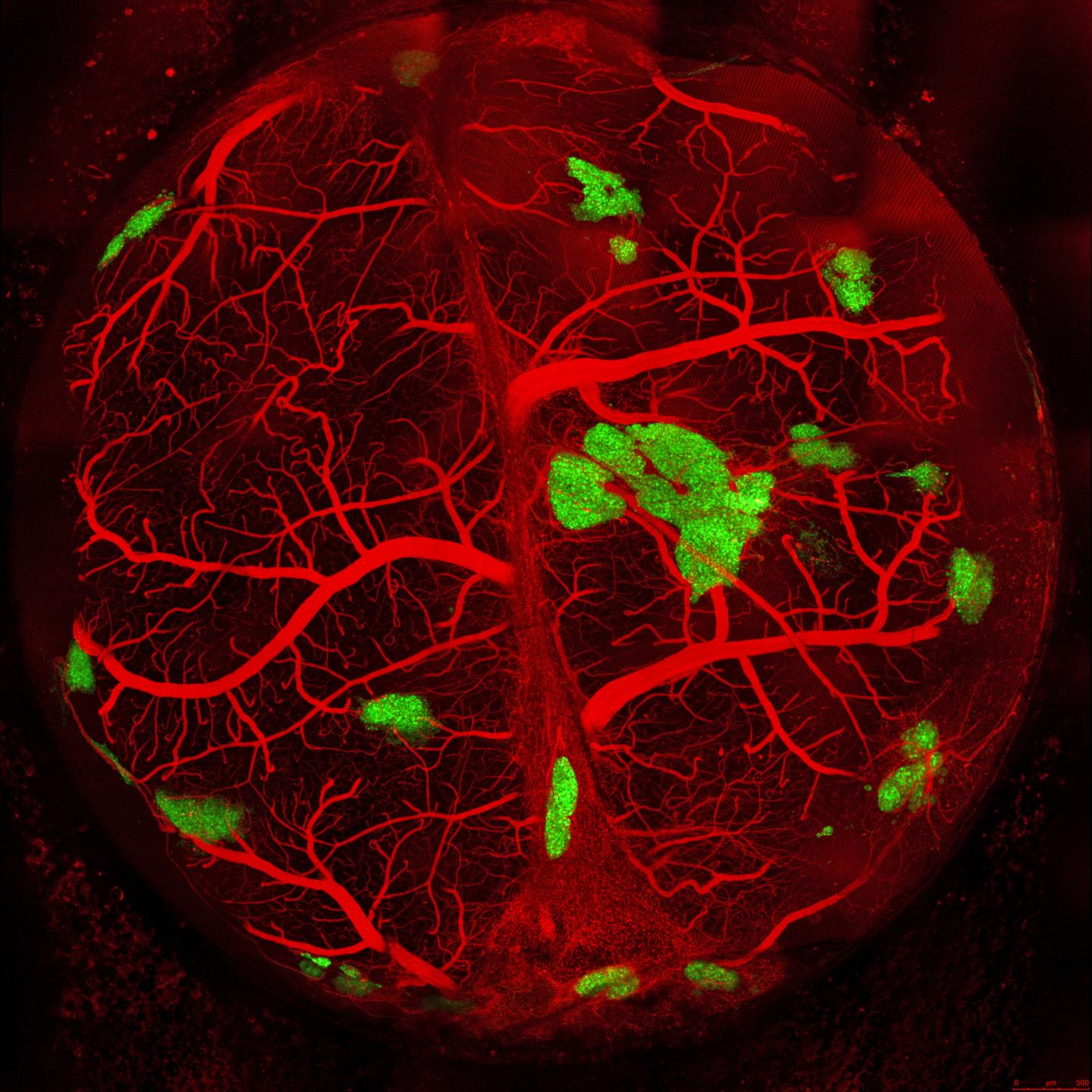
Vascularized pancreatic islets (areas in green) bioengineered by researchers and transplanted into a mouse. The bioengineered islets, which have a network of blood vessels (shown in red) and secrete hormones like insulin, are shown seven days after transplant. [Cincinnati Children's].
Researchers in Japan and the U.S. have developed a laboratory technique for generating vascularized pancreatic islet tissue that when transplanted into diabetic mice grows a system of mature blood vessels and secretes insulin to control the animals' blood sugar.
The team, led by Hideki Taniguchi, M.D., Ph.D., and colleagues at the Yokahama City University Graduate School of Medicine in Japan, developed a tissue engineering method, known as self-condensation cell culture, which can generate endothelialized 3D tissue oganoids from multiple types of cells and diverse tissue fragments derived from a variety of organs. They say results from in vivo studies in which bioengineered human and mouse islets were transplanted into diabetic mice indicate that the technology could be used to create vascularized, functional islet tissue transplants for treating type 1 diabetes in humans.
Survey study for transplant surgeons
Dr. Nancy Ascher and Dr. Chris Freise from the University of California, San Francisco, invite you to participate in a short survey study (5 minutes) on kidney transplantation in women with breast cancer. A diagnosis of breast cancer in a patient awaiting kidney transplantation might affect candidacy for receiving a transplant. Understanding how transplant surgeons make decisions in these situations could improve management recommendations and inform future trials. All participants will have the option of receiving the survey results. We appreciate your time!
In the News
Liver Cells Switch Identities to Grow New Tissue
May 2 - By studying a rare liver disease called Alagille syndrome, scientists from UC San Francisco and Cincinnati Children's Hospital Medical Center have discovered the mechanism behind an unusual form of tissue regeneration that may someday reduce the need for expensive and difficult-to-obtain organ transplants.
CLICK TO READ THE FULL ARTICLE
Lung Transplants in Scleroderma Patients As Safe, Effective As in Other Lung Disease Patients, Study Shows
May 3 - Patients with scleroderma who undergo lung transplants have similar survival rates to patients who get lung transplants due to other diseases, according to a new study.
CLICK HERE TO READ THE ARTICLE
A transplant of CRISPR-edited liver cells could replace lifelong injections for hemophilia B patients
May 3 - A Salk Institute team transplanted liver cells into mouse models of hemophilia B, finding that the treatment restored their ability to form blood clots for a year. The hope is that this one-and-done treatment could replace the frequent injections of clotting factors that are currently used to treat the inherited blood disorder.
Almost 100,000 Canadians registered to donate organs after Humboldt Broncos crash
May 8 - The crash killed 16 team members and staff, including 21-year-old Logan Boulet of Lethbridge, who signed his organ donor card just weeks earlier and wound up saving six lives. The “Logan Boulet effect” has snowballed across the country, too. Nearly 100,000 Canadians have signed up to become organ donors since the April 6 crash.
Contact
Address
The Transplantation Society
International Headquarters
740 Notre-Dame Ouest
Suite 1245
Montréal, QC, H3C 3X6
Canada
Используйте Вавада казино для игры с бонусом — активируйте промокод и начните выигрывать уже сегодня!

